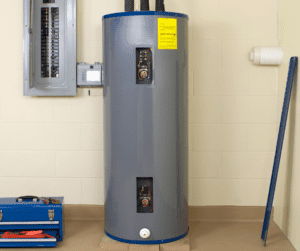
When it comes to household appliances, the water heater is often taken for granted. After all, it’s out of sight and out of mind until you step into a cold shower or need hot water for cooking or cleaning. However, one critical aspect of water heater maintenance is setting it to the right temperature. Many homeowners may not be aware of the potential risks of setting it too low or too high. Whether you’re a new homeowner or a long-time resident, remember, 120°F or Bust: Why your water heater temperature is vital for your health, safety, and energy efficiency.
Lower Than 120°F – Bacteria Can Grow
Did you know that setting your water heater temperature too low can actually pose a health risk? When the water temperature is set below 120°F, bacteria can grow in the tank and pipes. This can lead to the growth of harmful pathogens like Legionella, the bacteria responsible for Legionnaires’ disease. Legionnaires’ disease is a severe form of pneumonia that can be fatal in some cases, especially for individuals with weakened immune systems.
While Legionnaires’ disease is not common, it is a risk that should not be taken lightly. The Centers for Disease Control and Prevention (CDC) recommends maintaining water heaters at a temperature of at least 120°F to prevent bacterial growth. Additionally, the American Society of Heating, Refrigerating, and Air-Conditioning Engineers (ASHRAE) recommends a temperature of 135°F for healthcare facilities, hotels, and other buildings with high-risk populations.
Higher Than 130°F – Risk of Scalding
While setting your water heater temperature too low can pose health risks, setting it too high can be equally dangerous. Water that’s too hot can cause burns and scalding injuries, especially in children, elderly individuals, and people with sensitive skin.
When the water temperature is above 130°F, it takes less time and exposure to cause a burn or scalding injury. In fact, the American Burn Association recommends a maximum hot water temperature of 130°F to prevent burns and scalding injuries.
Energy Efficiency
Setting your water heater to the recommended temperature of 120°F not only helps protect your health and safety but can also save you money on your utility bills. When your water heater is set too high, it uses more energy to maintain that temperature, resulting in higher utility bills. On the other hand, setting it to 120°F can help reduce energy consumption and lower your monthly bills. Additionally, using energy-efficient appliances and practices can play a significant role in reducing your carbon footprint and protecting the environment. By setting your water heater to the right temperature, you can not only save on costs but also contribute to a more sustainable future.
Conclusion
Setting your water heater to the recommended temperature of 120°F is crucial for maintaining a safe and healthy home. By finding the right balance between safety, health, and energy efficiency, you can reduce the risk of bacterial growth, burns, and scalding injuries, while also saving money on your utility bills.
Get a Home Energy Audit
If you’re unsure about your water heater’s temperature or need help adjusting it, don’t hesitate to give us a call. We can help ensure that your water heater is set to the right temperature and functioning correctly, so you can have peace of mind knowing your home is safe and efficient. A home energy audit offers a great way for you to identify some of these issues listed. Home energy audit professionals can also provide you with advice on how to save energy. If you’re ready to schedule a home energy audit, please contact us today.
